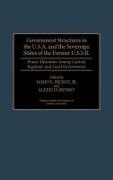Ulteriori informazioni
In this volume, experts on government examine historical as well as contemporary contexts to government structures in the United States and the states of the former U.S.S.R. Throughout, the contributors look at federalism at both local and national levels, and they try to assess how and why the two systems developed as they did. While the political history of the former Soviet Union favored a central monopoly-of-power system over a pluralism-of-separate-authority approach, this provides only part of an answer to a complex issue.
Taken together the collection provides an exhaustive examination of the opportunities and obstacles presented by government structures, which reflect the need for both local autonomy and concerned action. This volume will be of concern to political figures and policymakers, constitutional experts, and political scientists.
Sommario
Historical PerspectivesPolitical Structure and Power: Is Philadelphia a Model for Moscow? by John N. Hazard
The First National Constitution of the United States by Gordon S. Wood
The Russian Federation: History and Contemporaneity by Mikhail Marchenko
The Limits of Federalism and the Collapse of the U.S.S.R. by Robert V. Daniels
Incipient Federalism in Late Imperial Russia by Thomas Earl Porter
A Comparative OverviewModern Federalism: Comparative Perspectives and Lessons for the Commonwealth of Independent States and Russia by Erik P. Hoffman and Richard P. Nathan
American and Soviet Perspectives on Federalism: A Cross-National Analysis by Sarah F. Liebschutz and Barbara Jancar-Webster
Reconstruction in the U.S.S.R. and the Experience of the West by Vladimir A. Saveliev
A Comparative Analysis of Theories of Sovereignty in the Former U.S.S.R. and Yugoslavia by Helen Ostrovidova
Government Power and AccountabilityJudicial Power in the United States by Hans A. Linde
The Role of the Courts in the Federal System of the United States by Martha A. Field
Constitutional Interpretivism and Criminal Procedure in the New Russian Constitution by Catherine Thérèse Clarke
The "President" and State Authorities in Ukraine by Yurii S. Shemshuchenko
State and Federal Foreign Affairs Power in the United States by Susan W. Tiefenbrun
Delineation of Foreign Policy Powers Within the Framework of the Soviet Confederation (Based on Materials of Kazakhstan and Central Asian States) by Marat A. Sarsembayev
International Trade and Investment Relations Under the Federation Treaty by W. Gary Vause
State and Local GovernmentFederalism in Political Structure and Power: The New Role of Federal Law in Constraining Political Processes in American State and Local Governments by Richard Briffault
Decentralization Costs and Benefits: Designing a Federal State by Philip J. Grossman and Priya Rajagopalan
Municipal Strategy for Developing Regional Free Enterprise in Siberia by L. M. Simonova
The Struggle for Power Allocation Between the Central Government in Moscow and the Administration of the Tyumen Region by Alexei I. Ivandaev
Elements of Federalism in Relations Between Regional and Local Authority During the Perestroika Period in the U.S.S.R. (As Exemplified by Siberia) by Irina A. Vekshina
The Role of National Institutions of Local Government in the Socioeconomic Development of Indigenous Northern Populations in Siberia by Gennadii N. Chebotarev
Communication and NewsFederal Preemption of Local Regulation of Cable Television by Thomas W. Hazlett
Levels of the Game: Federalism and the American News System by Stephen Hess
Energy and the EnvironmentReform of Federalism and Ecological Security by Oleg S. Kolbasov
Fractal Federalism: Evolving National-State Relations in U.S. Environmental Law by Lee P. Breckenridge
Federalism and Problems of Environmental Protection in Sovereign Ukraine by Svetlana N. Kravchenko
The Issue of Ecological Federalism in the Context of Regional and World Development by Yuri Tunitsia
The Government Structure Over the U.S. Electric Industry: Federal-State Tensions by James E. Hickey, Jr.
The Influence of Local Authorities and the Public on Energy Policy in Ukraine by Victoria Yegorova
Economics, Finance, and BankingThe Invisible Thread: Free Market Forces in Pre- and Post-Soviet Russia by Robert B. Charles
Market Economy and Federalism by Jonah Otelsberg
Economic Sovereignty: New Aspects of Interaction Between Economics and Politics by Temiruz A. Beridze
Federal Aspects of the Development of U.S.S.R. and RSFSR Economic Laws During the Period of Perestroika by Olga Floroff
Financial Reform in the Former U.S.S.R. by Nicholas N. Kozlov
Some Aspects of the Banking System in Russia by Sergei N. Gonchar and Tatiana U. Frolova
Designing a Bank Regulation System for the Former U.S.S.R.: Federalism Issues Under the U.S. Dual Banking System by James W. Weller
Individual and Collective Human RightsMoral Dimensions of Federalism by William Rich
Protection and Promotion of Human Rights: Power Allocation Among Central, Regional, and Local Governments in the Russian Federation by Boris A. Tsepov
Concept of Federalism in Light of the Rights of Nations to Self-Determination by Boris Sergeevich Krylov
Cultural Problems of Federalism in Tajikistan by Zulfia Mirshakar
Consumer Protection Laws of the States: How Much Diversity Should the Central Government Discourage? Where Desirable, How Should Unifo
Info autore
JAMES E. HICKEY, JR., is Professor of Law, School of Law, Hofstra University.
ALEXEJ UGRINSKY is Director, Documentation, Finance and Planning, Hofstra Cultural Center.

